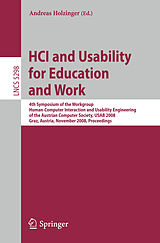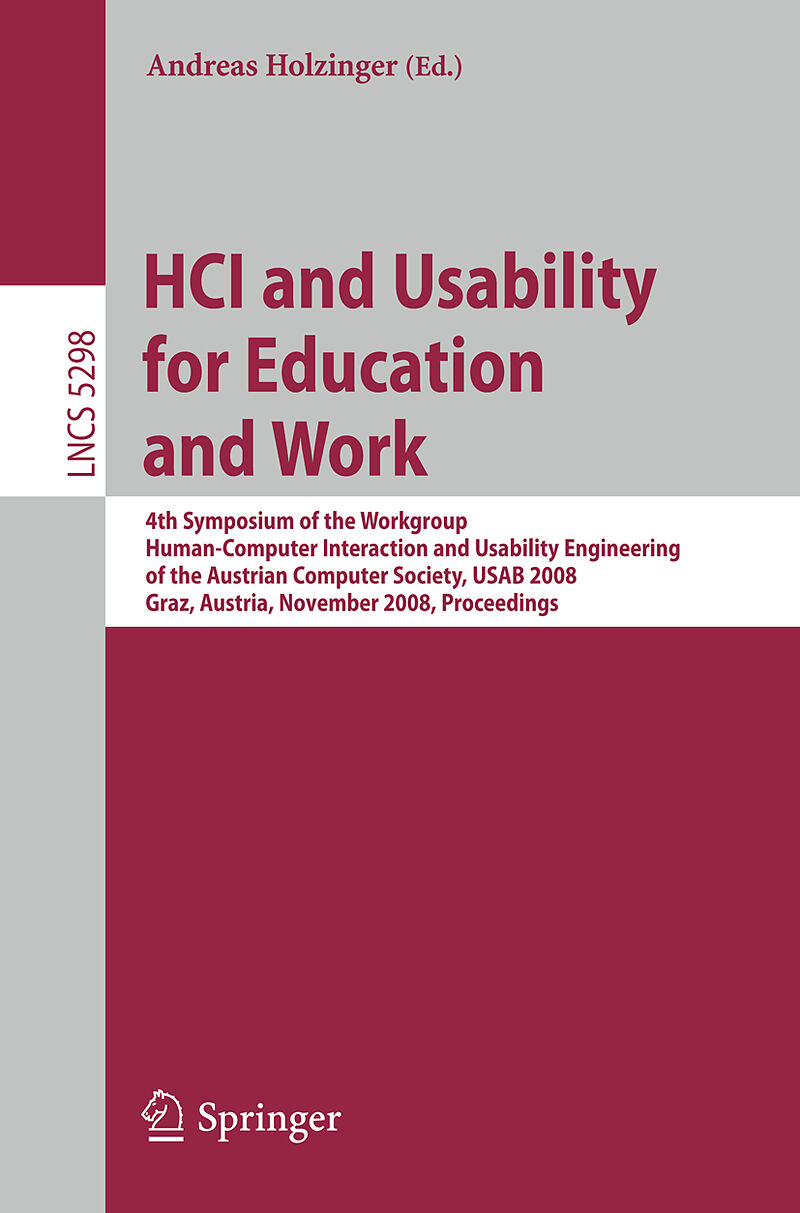HCI and Usability for Education and Work
Einband:
Kartonierter Einband
EAN:
9783540893493
Untertitel:
4th Symposium of the Workgroup Human-Computer Interaction and Usability Engineering of the Austrian Computer Society, USAB 2008, Graz, Austria, November 20-21, 2008, Proceedings
Herausgeber:
Springer Berlin Heidelberg
Auflage:
2008
Anzahl Seiten:
508
Erscheinungsdatum:
13.11.2008
ISBN:
3540893490
The Workgroup HumanComputer Interaction & Usability Engineering (HCI&UE) of the Austrian Computer Society (OCG) serves as a platform for interdisciplinary - change, research and development. While humancomputer interaction (HCI) tra- tionally brings together psychologists and computer scientists, usability engineering (UE) is a software engineering discipline and ensures the appropriate implementation of applications. Our 2008 topic was HumanComputer Interaction for Education and Work (HCI4EDU), culminating in the 4th annual Usability Symposium USAB 2008 held during November 2021, 2008 in Graz, Austria (http://usab-symposium.tugraz.at). As with the field of HumanComputer Interaction in Medicine and Health Care (HCI4MED), which was our annual topic in 2007, technological performance also increases exponentially in the area of education and work. Learners, teachers and knowledge workers are ubiquitously confronted with new technologies, which are available at constantly lower costs. However, it is obvious that within our e-Society the knowledge acquired at schools and universities while being an absolutely necessary basis for learning may prove insufficient to last a whole life time. Working and learning can be viewed as parallel processes, with the result that li- long learning (LLL) must be considered as more than just a catch phrase within our society, it is an undisputed necessity. Today, we are facing a tremendous increase in educational technologies of all kinds and, although the influence of these new te- nologies is enormous, we must never forget that learning is both a basic cognitive and a social process and cannot be replaced by technology.
Autorentext
Ing. Mag. rer. nat. Mag. phil. Dr. phil. Andreas Holzinger, geb. 1963 in Graz, Radio- und Fernsehtechniker, Industrietätigkeit in der Informationstechnik, Werkmeister für Industrielle Elektronik und Lehrlingsausbilderprüfung. College of Further Education Bournemouth (England) mit Schwerpunkt Computertechnik. Studien der Nachrichtentechnik, Physik und Psychologie sowie Medienpädagogik und Soziologie an der TU und Uni Graz. Promotion mit 'summa cum laude' auf dem Gebiet der Kognitionswissenschaft. Hochschullehrer am Institut für Informationsverarbeitung und computergestützte neue Medien der TU-Graz. Vorstandsassistent am Institut für medizinische Informatik, Statistik und Dokumentation. Konsulent des österreichischen Wissenschaftsministeriums. Österreichischer Experte in der Europäischen Union im Bereich Multimedia (eEurope). Dr. Holzinger forscht, arbeitet und lehrt in den Gebieten: Informationssysteme, Multimedia, Human-Computer-Interaction, Internet/Intranet, Intelligente Tutorielle Systeme.
Klappentext
This book constitutes the refereed proceedings of the 4th Usability Symposium of the Human-Computer Interaction and Usability Engineering Workgroup of the Austrian Computer Society, USAB 2008, held in Graz, Austria, in November 2008.The 7 revised full papers and 26 revised short papers presented were carefully reviewed and selected from 85 submissions. The papers are organized in topical sections on cognitive processes and end user experience, social software and collaborative knowledge development, knowledge processing, assessment and human performance, human centered development and design accessibility, user centred information visualization and multimedia, adaptivity and personalization in ubiquitous learning systems, and human centred design for safety critical systems.
Zusammenfassung
The Workgroup HumanComputer Interaction & Usability Engineering (HCI&UE) of the Austrian Computer Society (OCG) serves as a platform for interdisciplinary - change, research and development. While humancomputer interaction (HCI) tra- tionally brings together psychologists and computer scientists, usability engineering (UE) is a software engineering discipline and ensures the appropriate implementation of applications. Our 2008 topic was HumanComputer Interaction for Education and Work (HCI4EDU), culminating in the 4th annual Usability Symposium USAB 2008 held during November 2021, 2008 in Graz, Austria (http://usab-symposium.tugraz.at). As with the field of HumanComputer Interaction in Medicine and Health Care (HCI4MED), which was our annual topic in 2007, technological performance also increases exponentially in the area of education and work. Learners, teachers and knowledge workers are ubiquitously confronted with new technologies, which are available at constantly lower costs. However, it is obvious that within our e-Society the knowledge acquired at schools and universities while being an absolutely necessary basis for learning may prove insufficient to last a whole life time. Working and learning can be viewed as parallel processes, with the result that li- long learning (LLL) must be considered as more than just a catch phrase within our society, it is an undisputed necessity. Today, we are facing a tremendous increase in educational technologies of all kinds and, although the influence of these new te- nologies is enormous, we must never forget that learning is both a basic cognitive and a social process and cannot be replaced by technology.
Inhalt
Cognitive Processes and End User Experience.- Learners, Technology and the Brain.- Challenges in the Development and Evaluation of Immersive Digital Educational Games.- Evaluating the Motivational Value of an Augmented Reality System for Learning Chemistry.- Cognitive Processes Causing the Relationship between Aesthetics and Usability.- Educational Uses of the e-Book: An Experience in a Virtual University Context.- Construction and Evaluation of a User Experience Questionnaire.- Social Software and Collaborative Knowledge Development.- Integration of a Wiki for Collaborative Knowledge Development in an E-Learning Context for University Teaching.- Web 2.0 and Social Software: Challenges and Complexity of Communication in Education.- Using ePortfolios Enhancing for Learning through Computer-Mediated Interaction in a Course on HCI.- Knowledge Processing, Assessment and Human Performance.- Knowledge-Based Patterns of Remembering: Eye Movement Scanpaths Reflect Domain Experience.- Knowledge Assessment Based on Evaluation of 3D Graphics Annotation in Lesson Context.- The Influence of Instruction Mode on Reaching Movements during Manual Assembly.- Usability Metrics of Time and Stress - Biological Enhanced Performance Test of a University Wide Learning Management System.- Human Centered Development and Design Accessibility.- Users' Experience with a Recommender System in an Open Source Standard-Based Learning Management System.- The Role of Usability in the Design and Evaluation of Dynamic Traffic Displays.- Affordances in Conversational Interactions with Multimodal QA Systems.- E-Learning: A Tool for Teachers with a Disability.- More Than Just a Game: Accessibility in Computer Games.- User Centred Information Visualization and Multimedia.- Visualizations at First Sight: DoInsights Require Training?.- PowerPoint Multimedia Presentations in Computer Science Education: What Do Users Need?.- Analysis of Ontology Visualization Techniques for Modular Curricula.- Agile User-Centered Design Applied to a Mobile Multimedia Streaming Application.- Adaptivity and Personalization in Ubiquitous Learning Systems.- Adaptivity and Personalization in Ubiquitous Learning Systems.- Instruction Formats and Navigation Aids in Mobile Devices.- HCI Research for E-Learning: Adaptability and Adaptivity to Support Better User Interaction.- Personalized E-Learning through Environment Design and Collaborative Activities.- Avatars in Assistive Homes for the Elderly.- Using Clustering Technique for Students' Grouping in Intelligent E-Learning Systems.- Adaptation Criteria for Preparing Learning Material for Adaptive Usage: Structured Content Analysis of Existing Systems.- Human Ce…

Leider konnten wir für diesen Artikel keine Preise ermitteln ...
billigbuch.ch sucht jetzt für Sie die besten Angebote ...
Die aktuellen Verkaufspreise von 6 Onlineshops werden in Realtime abgefragt.
Sie können das gewünschte Produkt anschliessend direkt beim Anbieter Ihrer Wahl bestellen.
Loading...
Die aktuellen Verkaufspreise von 6 Onlineshops werden in Realtime abgefragt.
Sie können das gewünschte Produkt anschliessend direkt beim Anbieter Ihrer Wahl bestellen.
| # | Onlineshop | Preis CHF | Versand CHF | Total CHF | ||
|---|---|---|---|---|---|---|
| 1 | Seller | 0.00 | 0.00 | 0.00 |
